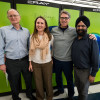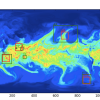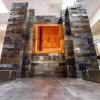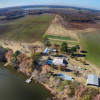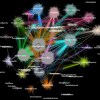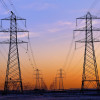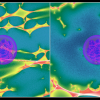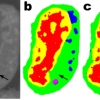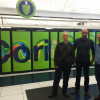News
Secretary of Energy Rick Perry Visits Berkeley Lab
During his visit to Berkeley Lab's Shyh Wang Hall, Energy Secretary Rick Perry learned about our computational research program, toured NERSC and transferred 500GB of data over ESnet. Read More »
Deep Learning at 15 PFlops Enables Training for Extreme Weather Identification at Scale
Petaflop per second deep learning training performance on the Cori supercomputer at NERSC has given climate scientists the ability to use machine learning to identify extreme weather events in huge climate simulation datasets. Read More »
Underground Neutrino Experiment Could Provide Greater Clarity on Matter-Antimatter Imbalance
A new underground neutrino experiment could provide greater clarity on matter-antimatter imbalance in the Cosmos. And NERSC will be the principal site for data processing and analyses throughout the course of the experiment. Read More »
'Farm of the Future' Project Marries Microbiology, Machine Learning
There’s a farm in Arkansas growing soybeans, corn, and rice that is aiming to be the most scientifically advanced farm in the world. Soil samples are run through powerful machines to have their microbes genetically sequenced, drones are flying overhead taking hyperspectral images of the crops, and soon supercomputers will be crunching the massive volumes of data collected. Read More »
A Game Changer: Metagenomic Clustering Powered by HPC
A team of researchers from Berkeley Lab's CRD and JGI took one of the most popular clustering approaches in modern biology—the Markov Clustering algorithm—and modified it to run quickly, efficiently and at scale on distributed-memory supercomputers. Read More »
Combination of Old and New Yields Novel Power Grid Cybersecurity Tool
An R&D project led by Berkeley Lab researchers that combines cybersecurity, machine learning algorithms and commercially available power system sensor technology to better protect the electric power grid has sparked interest from U.S. utilities, power companies and government officials. Read More »
Interested Staff Invited to Apply to Attend 5-Day Machine Learning Hackathon
Staff in the lab's Computing Sciences and Biosciences areas are invited to participate in a weeklong workshop focusing on machine learning in data science. The goal of the workshop, to be held April 2-6, is to build bridges between Computing Sciences and Biosciences through a common foundation in statistical computing. The course is open to all staff in Biosciences and Computing Sciences, but prerequisite training in basic Python, basic linear algebra and basic to intermediate statistics… Read More »
Can Strongly Lensed Type Ia Supernovae Resolve One of Cosmology’s Biggest Controversies?
Using the SciDAC developed SEDONA code and NERSC supercomputers, astrophysicists at Berkeley Lab and the University of Portsmouth discovered how to control the effects of "microlensing." Armed with this knowledge they believe they will be able to find 1000 strongly lensed Type Ia supernovae in real-time from LSST data--that's 20 times more than previous expectations. Read More »
Berkeley Lab “Minimalist Machine Learning” Algorithms Analyze Images from Very Little Data
Berkeley Lab mathematicians have developed a new approach to machine learning aimed at experimental imaging data. Rather than relying on the tens or hundreds of thousands of images used by typical machine learning methods, this new approach “learns” much more quickly and requires far fewer images. Read More »
Physics Data Processing at NERSC Dramatically Cuts Reconstruction Time
In a recent demonstration project, physicists from Brookhaven National Laboratory and Berkeley Lab used the Cori supercomputer to reconstruct data collected from a nuclear physics experiment, an advance that could dramatically reduce the time it takes to make detailed data available for scientific discoveries. Read More »







 Instagram
Instagram YouTube
YouTube